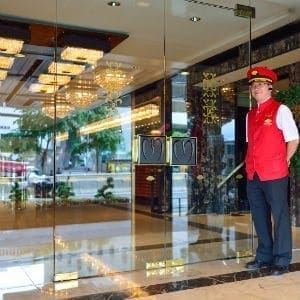 From leading heritage tours to greeting hotel guests, hundreds of Emiratis will soon represent the UAE’s hospitality industry. A new campaign aims to recruit 500 Emiratis for the tourism sector by 2020. Some students have already graduated from hospitality training courses.
From leading heritage tours to greeting hotel guests, hundreds of Emiratis will soon represent the UAE’s hospitality industry. A new campaign aims to recruit 500 Emiratis for the tourism sector by 2020. Some students have already graduated from hospitality training courses.
The Dubai College of Tourism’s Industry Nationalisation Initiative, a new Emiratisation scheme, trains university and high-school graduates for front-of-house positions, in addition to offering vocational training and job opportunities to the unemployed and others wanting to enter the sector.
Mariam Al Maeeni, who manages the initiative, said outreach initiatives had helped to expose Emiratis to opportunities in the two industries. “We’ve educated them on open days about the need to be in tourist-facing roles to represent their culture and tradition,” she said.
Mohammed Al Mullah, 23, was among the first batch of students to sign up for the initiative’s two-month programme for graduates. A communications graduate, Mr Al Mullah felt his education could be put to good use in the hospitality business.
“Hospitality is part of our culture and our homes,” said the Ajman native. “At first my parents weren’t so keen on the idea because when you say you work for a hotel, it’s seen as a little lowly. But when I explained that within the hotel are careers you’d find in any major company, they began to change their minds and are now very supportive.”
During his work experience in Al Habtoor City’s network of hotels, Mr Al Mullah learnt every aspect of hotel work Ð from housekeeping to front office, as well as human resources and marketing. “The number of Emiratis in tourism will grow,” he said. “The industry just needs more awareness of the careers it can offer. But with the approach of 2020, people do see the need to be involved more and more.
“The economy depends on tourism, so we do feel a responsibility to be a part of that.”
Elham Al Saffar, a member of the initiative’s pioneer group of graduates, is training to be a tour guide. “I believe it’s important to have Emiratis represent their country and culture. It’s like when you travel to other places, people like to meet the locals,” she said.
Ms Al Saffar, 28, said Dubai’s hotels lacked the “local touch” and she hoped to be part of the generation to change that.
“Emiratis aren’t there meeting and welcoming guests. For Emirati families, it’s still a bit taboo for women to meet strangers. But I think that’s changing now, people are adapting,” she said.
Khalaf Al Habtoor, Chairman of the Al Habtoor Group, which owns hotels across Dubai, said recruiting more Emiratis into the industry was vital, but he acknowledged that there must be incentives to hire and retain them.
“It is important that the hospitality industry is represented by Emiratis and not just foreign talent,” he said. “We need to ensure that visitors get an authentic experience when they visit Dubai and the other emirates.
“We need to find committed Emiratis who are able to represent their country throughout all key sectors of the economy, not just government departments. It is important for the preservation of our national identity.”
Mr Al Maeeni said there would be challenges in attracting Emiratis to the hospitality industry. “It’s about how you position this to Emiratis to show them the real nature of these kinds of jobs,” she said. “People have a misunderstanding and misconception about the industry.”
Gerhard Hecker, General Manager of Shangri-La Hotel in Dubai, which has 20 Emirati employees, said career development incentives must be in place. “It is not just about hiring Emiratis, we have concentrated on their development as well,” he said.
“We have implemented various training programmes throughout the hotel to invest in their growth, with the future goal of elevating them to managerial and executive-level positions.”
By Melanie Swan at The National UAE















